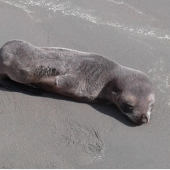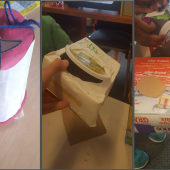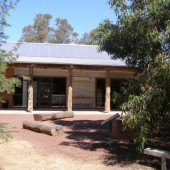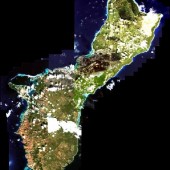
Abstract: Early childhood educators emphasize that outdoor education learning outcomes are very important for preschoolers because early childhood education has a huge effect on the later stage of adulthood. Outdoor education can take place on playgrounds or in natural environments. The aim of this study was to determine some effects of an unstructured outdoor activity on preschoolers. A qualitative case study methodology was used in order to assess the effect of a bush explorer activity on children. In terms of establishing the research’s reliability, the qualitative analyses were supported by the triangulation data collection methods, which included non-participant observation and parents’ interviews. Content analysis was used in order to evaluate the data. According to the results, eleven different themes were determined: Problem solving, self-confidence, environmental awareness, observing and exploring, friendship and social skills, creativity, sharing experience, relaxing, having fun, conflict, and rejection. All themes, except conflict and rejection, are coherent with the literature.
Continue Reading
Abstract: This case study illustrates a cross-curricular learning experience, anchored in standards, where teachers and students actively engaged in co-constructed, inquiry-based learning and design thinking. The particular question this case study addressed was “How might students connect with environmental citizenship in authentic ways through media literacy experiences?” Specifically, the case study invited primary level learners to engage in a multimodal experience that was anchored in media literacy concepts and process. A pedagogical approach rooted in media literacy theory subsequently empowered students to make positive environmental changes in their communities and develop citizenship skills for the future. The project sought to develop awareness of sustainability through analysis, re-design, and production of snack food packaging. Educator reflections offer ideas for project improvement, such as producing for a wider audience, offering more choice, and making broader subject connections. This case study has implications for practice by demonstrating that, through various stages of scaffolding and integrated lesson design, young children are capable of applying sophisticated media literacy theory, inquiry, and design thinking to meet multiple curriculum standards.
Continue ReadingIn 1999, the National Association of Social Workers (NASW) in the United States published a policy statement on the environment that acknowledged the social work profession’s apparent “lack of interest” in environmental issues, and called for a new urgency among social workers to address the challenges of pollution, environmental contamination, and resource depletion. Despite this call for urgency and the increasing certainty of widespread social and environmental crises due to climate change, the integration of ecological concepts into mainstream social work education and practice has been slow and sporadic. Only recently have some social workers begun to openly discuss a re-centering of social work within a sustainability paradigm, emphasizing the importance of interconnectedness among humans and the natural world, interdisciplinary alliances and partnerships, and holistic justice-focused practice. This paper explores the potential for a case study assignment in a Master of Social Work (MSW) program to help make explicit connections between sustainability concepts introduced in the classroom and the practical application of these concepts in a wide range of social work practice settings. Three sample case studies from students are presented, and advantages and challenges of this pedagogical approach are discussed.
Continue Reading
When the Department of Geography at the University of Oklahoma expanded its undergraduate degree options to include Environmental Sustainability in 2011, it was faced with the question of how should the Life-Cycle Assessment (LCA) core course be taught, and what aspects of LCA should it cover. In addition to the textbook selected for the classroom, it was clear that students would also need to get hands-on experience using LCA in a manner that reinforced and extended the themes taught in class. This dual challenge was resolved with the selection of a readable and easily understood text and the adoption of Sustainable Minds software for the conduct of student projects. In this paper, we describe the manner in which LCA is taught in the classroom and the important role that LCA software has played to help students acquire a working understanding of the merits of the technique as well as its limitations. Examples of student projects that were completed as course assignments are used to illustrate the scope of student interests and accomplishments.
Continue Reading
Place-based education is education that is “grounded in the resources, issues, and values of the local community and focuses on using the local community as an integrating context for learning at all levels” (Powers, 2004, p. 17). The purpose for becoming conscious of places in education is to extend “notions of pedagogy and accountability outward, toward places” making learning more relevant to “the lived experiences of students and teachers… so that places matter to educators, students and citizens in tangible ways” (Gruenewald, 2003, p. 620). Although place-based education is interchangeable with a number of terms – community based learning, rural education, project-based learning, service learning, and sustainability education – it encompasses a broad hope by educators to connect student learning to their community and the community to participate in the school (Powers, 2004). Situated within this partnership between school and community fostered through place-based education is the opportunity for rural-regional sustainability. In particular, the case study showcases how a school and community in rural south-east Australia have regenerated a degraded community stock-reserve to ‘tear down’ the school walls (fences) and perform place through the (co)creation of the Flatlands Nature Reserve as a place of protection, regeneration and environmentally sustainable practices. Furthermore, the story of the Flatlands Nature Reserve shows that “place is not only local, specific and static” but can be seen as a ‘revitalizing of the commons’ (Bowers, 2005) which has co-created a place of bio-diversity, regeneration and sustainability education that has fostered rural-regional sustainability.
Continue Reading
The purpose of this qualitative case study was to examine the perceived impact of a fashion course that was reframed for sustainability using the education for sustainable development (ESD) framework. Specifically, the study explores the holistic integration of sustainability in a curriculum focused on the making and marketing material products, a seemingly counterintuitive context. Data collection included student reflective writings, focus group interviews, and a reflexive research journal kept by the researcher. ESD manifested in the student experience to the greatest degree in learning and development outcomes related to sustainability literacy and working with others. Interestingly, outcomes related to sustainability literacy were overshadowed by a substantial leap in collaborative and cooperative capacity, according to students. Notably, this case demonstrates that when sustainability is approached as a creative exercise, students take little issue with the new paradigm. This study also demonstrates how skills associated with ESD may be integrated into a course without sacrifice of course content, significantly enhancing the learning and development experience. The outcomes experienced by learners and the role ESD played in these outcomes provides important context for the integration of sustainability in a field of study preoccupied with the bottom line.
Continue Reading
Graduate students enrolled in an education research course (many of the students were school teachers) that the author taught during the spring 2010 semester participated in this “green” course project. Those students who were not school teachers, who worked for private companies or government agencies, focused their projects on green communities, workplaces, or households. Students conducted their projects based on inquiry-based learning, and this sustainability study reported in the current paper itself derives from an inquiry-based approach. The results from this study demonstrated that daily curricular activities at universities and schools provide an important way to support environmentally responsible living. Implementing green course projects similar to the one described here is one of many ways in which university teachers can incorporate “sustainability” into their curricula.
Continue Reading